| Formation | 1990 |
|---|---|
| Type | Non-profit |
| Headquarters | Oak Park, Michigan |
Region served | Metro Detroit |
CEO | Adrian Lewis |
Main organ | Board of Directors |
| Affiliations | Feeding America |
Budget | $77,220,713 [1] |
Staff | 71 |
Volunteers | 14,700 |
| Website | http://www.forgottenharvest.org |
Forgotten Harvest is a non-profit food rescue organization that collects food that would otherwise go to waste and delivers it free of charge to organizations feeding the hungry in Metro Detroit. In 2015, the nonprofit distributed more than 40 million pounds of food to more than 260 emergency food providers. [1]
Forgotten Harvest is a member of Feeding America, the United States' umbrella organization for food banks and food rescue agencies.
Forgotten Harvest was founded in 1990 by Nancy Fishman. Susan Goodell became the organization's CEO in 2000, and under her leadership the amount of food delivered increased significantly:
Forgotten Harvest was the first food rescue organization in the United States to form a rescue partnership with a grocery store, launching a program with Kroger in 1994. [2]
Forgotten Harvest operates a fleet of 33 refrigerated trucks that pick up surplus or unwanted food at health department-approved sources such as grocery stores, restaurants, stadiums, banquet facilities and other venues. It also works with local farmers to mobilize volunteers to harvest unwanted crops in their fields. [6]
Some major retailers and venues from which Forgotten Harvest collects food in Metro Detroit include Kroger, Costco, Meijer and Walmart stores, Comerica Park and The Henry Ford. [7]
Volunteers sort and repackage food at Forgotten Harvest's distribution center and trucks deliver the food free of charge to area nonprofit agencies that provide emergency food assistance in Metro Detroit. [8]
In 2011, Forgotten Harvest created Forgotten Harvest Canada , a Windsor, Ontario-based food rescue agency based on Forgotten Harvest's model. In its first fiscal year it delivered 135,000 pounds of food [9] and in 2013, the organization announced that it had reached a milestone of delivering one million pounds of food since its founding. [10]
In the spring of 2013, Forgotten Harvest launched a farming initiative, "Forgotten Harvest Farms," where it began growing its own food on donated farmland. [4] In October 2013, they announced an estimated 850,000 pound harvest in their first year, and the donation of $400,000 in farm equipment from Ram Truck, Case IH and New Holland Agriculture to support future growth in farm operations. [11]
Over the course of its first three years of operations, Forgotten Harvest Farms reported harvesting more than 3.1 million pounds of produce. [1]

Gleaning is the act of collecting leftover crops from farmers' fields after they have been commercially harvested or on fields where it is not economically profitable to harvest. It is a practice described in the Hebrew Bible that became a legally enforced entitlement of the poor in a number of Christian kingdoms. Modern day "dumpster diving", when done for food or culinary ingredients, is seen as a similar form of food recovery. Gleaning is also still used to provide nutritious harvested foods for those in need. It is modernly used due to a need for a national network to aid food recovery organizations in the United States. This is called the National Gleaning Project which was started by the Center for Agriculture and Food Systems at Vermont Law and Graduate School to aid those less fortunate much like the old Christian Kingdoms.
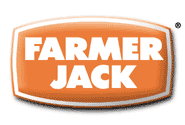
Farmer Jack was a supermarket chain based in Detroit, Michigan. At its peak, it operated more than 100 stores, primarily in metropolitan Detroit. In its final years, the chain operated as the Midwest subsidiary of the New Jersey-based A&P Corporation. A&P closed the Farmer Jack chain on July 7, 2007.
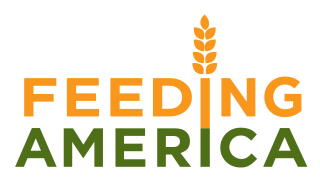
Feeding America is a United States–based nonprofit organization that is a nationwide network of more than 200 food banks that feed more than 46 million people through food pantries, soup kitchens, shelters, and other community-based agencies. Forbes ranks it as the largest U.S. charity by revenue. Feeding America was known as America's Second Harvest until August 31, 2008.

The Kresge Foundation is a philanthropic private foundation headquartered in Troy, Michigan, United States. The foundation works to expand opportunities in America's cities through grantmaking and investing in arts and culture, education, environment, health, human services and community development efforts. The Kresge Foundation is one of wealthiest charitable organizations in the world with an endowment of $4.3 billion as of June 2021.

Food rescue, also called food recovery, food salvage or surplus food redistribution, is the practice of gleaning edible food that would otherwise go to waste from places such as farms, produce markets, grocery stores, restaurants, or dining facilities and distributing it to local emergency food programs.
Ag Against Hunger is a non-profit organization based in Salinas, California that collects surplus produce from Monterey, San Benito and Santa Cruz County growers on the central coast of California. This fresh produce is then distributed to food banks throughout the west coast of the United States.
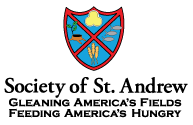
The Society of St. Andrew (SoSA) is a grassroots, faith-based, hunger relief nonprofit working with all denominations to bridge the hunger gap between 96 billion pounds of food wasted every year in the United States and the nearly 40 million Americans who live in poverty. SoSA relies on support from donors, volunteers, and farmers as they glean nutritious excess produce from farmers' fields and orchards after harvest and deliver it to people in need across the United States. SoSA provides nutritious, healthy produce through programs such as the Potato Project, the Gleaning Network, Harvest of Hope, and the Seed Potato Project.
Eleanor Mary Josaitis was the co-founder of Focus: HOPE.
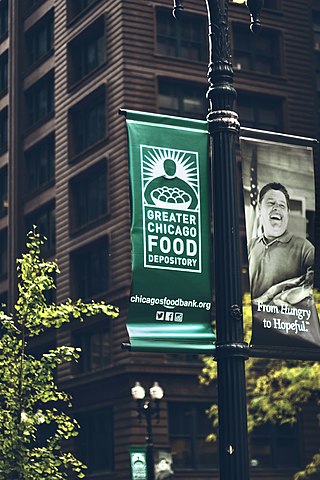
The Greater Chicago Food Depository (GCFD) is a nonprofit organization that fights hunger throughout Cook County, Illinois. The GCFD distributes donated and purchased food through a network of 700 food pantries, soup kitchens, shelters and community programs, serving more than 800,000 adults and children every year. In fiscal year 2016, the GCFD distributed more than 70 million pounds of nonperishable food, produce, dairy products, and meat - the equivalent of more than 160,000 meals every day. Of the $96,883,955 spent in 2016, over 90% went to direct food distribution programs.
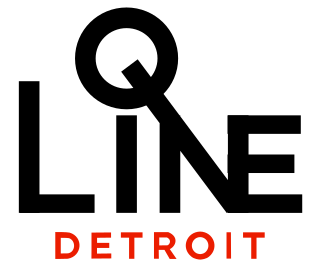
The QLine, originally known as M-1 Rail by its developers, is a 3.3-mile-long (5.3 km) streetcar system in Detroit, Michigan, United States. Opened on May 12, 2017, it connects Downtown Detroit with Midtown and New Center, running along Woodward Avenue (M-1) for its entire route. The system is operated by M-1 Rail, a nonprofit organization.

Leket Israel, The National Food Bank, a registered nonprofit Israel-based charity, is the leading food rescue organization in Israel, serving 175,000+ needy people weekly. Leket Israel rescues surplus agricultural produce and collects excess cooked meals for redistribution to the needy throughout Israel via its network of 200+ nonprofit organization (NPO) partners.
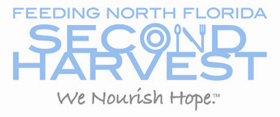
Second Harvest North Florida (SHNF) is a 501(c)(3) non-profit organization located in Jacksonville, Florida, that performs food rescue and redistribution to partner agencies in one quarter of Florida's 67 counties. The charitable organization has been active for over 30 years.
City Harvest is one of New York City's largest food rescue organizations. The organization collects food waste from restaurants, bakeries, and cafes.
Iskashitaa Refugee Network is a grass roots organization based in Tucson, Arizona, that partners with volunteers and local organizations to provide various supplemental services to refugees to complement those offered by resettlement agencies. The organization was founded by Dr. Barbara Eiswerth, who holds a Ph.D. in Arid Lands Resource Management, and is currently directed by Eiswerth. Iskashitaa has a number of programs designed to empower refugees and unite them with staff and volunteers from the community. A primary component of these programs is gleaning, or harvesting unwanted produce from property owners and commercial farmers. Iskashitaa's gleaning efforts have grown from harvesting a few thousand pounds of fruit each year to over 100,000 pounds annually of fruit, nuts, and vegetables: a cumulative one million servings of local produce.
Convoy of Hope is an American nonprofit humanitarian and disaster relief organization that provides food, supplies, and humanitarian services to impoverished or otherwise needy populations throughout the world. The organization also engages in disaster relief work. It was founded in 1994 by Hal, Steve, and Dave Donaldson in Sacramento, California, later moved its headquartered to its currently place in Springfield, Missouri, and is associated with the Assemblies of God and its Chi Alpha campus ministries and fellowships.

Capital Impact Partners, or simply Capital Impact, is a congressionally chartered, District of Columbia nonprofit and certified community development financial institution that provides credit and financial services to underserved markets and populations in the United States. S&P Global issued Capital Impact its first rating in 2017.

La Soupe is a Cincinnati, Ohio, nonprofit organization that uses discarded food to produce meals and delivers them to other nonprofit agencies for distribution to people experiencing food insecurity.

The Capuchin Soup Kitchen (CSK) is a religiously affiliated soup kitchen and non-profit organization located in Detroit, Michigan. It was founded by the Capuchin friars to provide food for the poor during the Great Depression and is sponsored by the Capuchin Franciscan Province of St. Joseph. While it was initially established as a soup kitchen, CSK now includes a food and clothing bank, a drug rehabilitation program, and an after school and summer youth program. Through its various ministries CSK serves approximately 560,000 individuals each year.

412 Food Rescue is a nonprofit organization based in Pittsburgh, Pennsylvania, US, dedicated to ending hunger by organizing volunteers to deliver surplus food to insecure communities instead of landfills. Since its creation in 2015, the organization has redistributed over three million pounds of food through the use of its mobile application, Food Rescue Hero. They are currently rolling out the app nationwide.

Rethink Food NYC Inc, commonly called Rethink Food or just Rethink, is a non-profit organization based in New York City. The organization was founded to address hunger in the United States by contributing to a sustainable and equitable food system. Rethink collects excess food from restaurants, grocery stores, and corporate kitchens to provide nutritious meals for people living without food security at low or no-cost. The organization expanded its operations in March 2020 to meet growing food demands amid the COVID-19 pandemic in the United States.